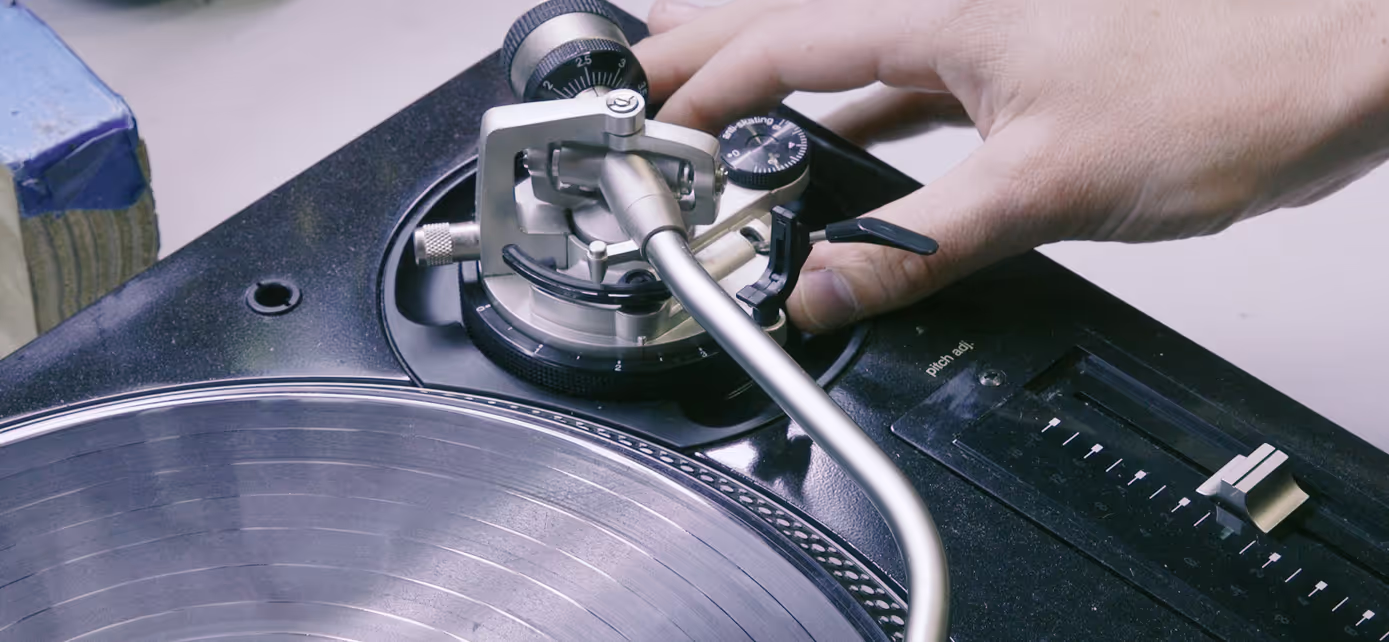
Are vintage turntables better?
Your expert guide to picking between a vintage or modern turntable.
In a digital age dominated by convenience, the vinyl revival is not just a trend—it’s a cultural renaissance, a rediscovery of an authentic, warm, and soul-stirring audio listening experience that only vinyl can offer.
Read more: A guide to the best vinyl accessories
This resurgence has sparked a significant debate among audiophiles—the timeless duel of analogue vs digital, or in this case: vintage vs modern turntables. As vinyl’s popularity soars, newcomers to the realm of record players find themselves at a crossroads, torn between the undeniable appeal of vintage turntables and the allure of modern designs laden with contemporary features. Whether to embrace the classic aesthetics and authenticity of vintage turntables or opt for modern conveniences and advancements remains at the forefront of this ongoing discourse.
The vintage turntable is a magnetic force, drawing enthusiasts through its irresistible blend of nostalgia, craftsmanship, and a unique auditory character that transcends time. Vintage turntables provide rarity, design, durability and a distinctive auditory character. Their analogue sound, characterised by warm, rich tones and the occasional imperfection, radiates an unparalleled character that remains impossible to replicate.
Owning a vintage turntable is akin to possessing a piece of music history. The Technics SL-1200 MK2 stands as a testament to this sentiment, revered by DJs and audiophiles alike. Its retro-futuristic design, accentuated by a quartz-locked direct drive system, propelled it to legendary status within the music industry during its time, and it is still highly sought after today.
While vintage turntables like the SL-1200 MK2 hold an irreplaceable place in the hearts of enthusiasts and collectors, manufacturers like Technics recognise its timeless appeal. Hence, they breathe new life into these classic models, as seen with the 2020 SL-1200 MK5. This rejuvenation, tailored with purists in mind, preserves the essence of the original while integrating modern engineering. It’s an homage to the legendary design, offering a chance for both veterans and newcomers to partake.
The appeal of vintage turntables also comes from their affordability in the second-hand market—a treasure hunt for audiophiles. However, initial cheapness can carry an intrinsic cost. Buying a vintage turntable entails a delicate balance, weighing the allure of vintage aesthetics and tried and tested build quality against the financial implications of maintaining an ageing device. While the initial purchase might seem like a bargain compared to its modern counterparts, hidden costs unravel through the upkeep and potential repairs these time-worn machines demand.

Functional issues frequently afflict vintage turntables because of use. Motor wear, where the power source weakens, disrupts rotation speed and consistency. Tonearms, essential for tracing vinyl grooves, often fall victim to misalignment or stiffness, compromising playback and potentially harming records. The cartridge, housing the stylus, faces degradation or misalignment, resulting in a decline in sound quality, necessitating replacement. Manufacturers discontinuing older cartridge models exacerbate this issue, making replacement both difficult and expensive and adding to the overall cost.
Conversely, modern turntables offer a solution, eradicating the uncertainties tied to second-hand purchases. Affordable entry-level options, such as the Audio-Technica AT-LP60-BT, priced reasonably at £150, embody convenience and reliability. In contrast to inferior suitcase turntables that risk record damage, this turntable strikes a balance between cost and quality. Its user-friendly design, easy setup, Bluetooth connectivity, and automatic functions make it an optimal choice for vinyl novices.

Vintage turntables also carry the burden of technological limitations–lacking the array of features that can enhance the listening experience. Due to modern craftsmanship and newer components, modern turntables redefine the listening experience with their sound quality and innovative features. They not only provide convenience but effectively address maintenance and usability concerns often associated with vintage models. With the inclusion of built-in preamps, modern turntables offer a plug-and-play ease of use, simplifying the setup process and enhancing compatibility with various audio systems.
Choosing between a vintage or modern turntable hinges on personal preferences. It’s a delicate balance between cherishing the reliability and charm of the past or embracing the audio technology of the present. Vinyl enthusiasts are fortunate to have a broad spectrum of options that cater to their unique tastes, allowing them to delve into the richness of music through their chosen avenue.
Ultimately, the choice boils down to the individual. Investing in a vintage model might be ideal if you prioritise familiarity and the warm, comforting sound of vintage turntables. On the other hand, if you value ease of use and an array of modern features, a new turntable is likely the better fit. Weighing these factors carefully ensures that the chosen turntable aligns perfectly with one’s needs and preferences, leading to a satisfying and enriching musical journey.
Check out more expert guides, including our guide to DJ headphones and the best vinyl accessories.









